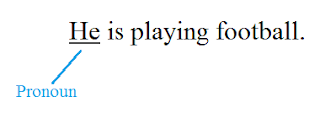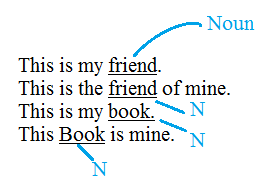- Used in place of 'Noun'.
Pronoun
Examples → He, she, his ,they ,we , us , me , my , mine , I , you , it , ours , your , your , hers , her , its , their , theirs
# Types
- Nominative : Used as a subject in the sentence.
Examples → I , We , You etc.
2. Objective : Used as an object in the sentence on which work is going on.
Examples → me , him , her , it etc.
3. Possessive : Pronouns which show possessiveness.
Difference Between ' my ' & ' mine '
→ ' my ' is used before the noun.
→ ' mine ' is used after the noun.
Difference Between ' your ' and ' yours '
→ ' Your ' used before the ' noun '.
→ ' Yours ' used after the ' noun '.
Table of Pronoun
# OBJECTIVE PRONOUN
Rule 1: After Preposition we have to use objective pronoun.
Example :
Example :
Difference between ' I ' and ' me '
' I ' is used as a subject , which is do some work.
' me ' is worked as object on which work is going on , so it always used as a object , ∴ is a objective noun and used after preposition.
Rule 2: After ' Let '
Objective pronoun is used after ' Let '
Examples:
# NOMINATIVE PRONOUN
Rule 3: After 'Than'
When there is any comparison between two , then nominative pronoun is used.
Examples:
- His efforts will bring him more success than your's.
- You should be true to your word. or One should be true to his word.
- The dog I have bought looks more ferocious(wild) , than the one you have.
- The hotel of Patna are more luxurious than those of Muzaferpur.
- Yours are the same problems as mine.
Reflexive Pronoun
# Transitive verbs :
Verbs which requires object after them, those are known as transitive verb.
Example:
Children fly kites.
Children fly kites.
[ here fly acts as transitive verb because children fly doesn't make any sense, So noun is used to complete the sentence Those verbs which always comes along with Pronoun or noun is known as transitive verb ]
Birds fly.
[ Here fly is not a transitive verb ]
Some verb which act as transitive verbs
We use a reflexive pronoun as object or complement when it refers to the same thing as the subject.The pronouns which are used with transitive verb as a object are known as reflexive pronoun.
Reflexive Pronoun are :
- he → himself
- her → herself
- it → itself
- they → themselves
- I → myself
- you → yourself
- we → ourselves
- one → oneselfs
[ here , absent is not work as transitive verb , it is used as adjective so reflexive pronoun is not used here]
He prostrated himself before his master , who had come from london after a year.
The officer as well as the assistants absented themselves from the office.[ Correct ; himself ]
[ In the sentence there is ' as well as ' used with which verb is changed to 1st noun or pronoun and here officer , so 'themselves' is changed himself.
* Exception
Transitive verb does not use reflexive pronoun.
- keep
- stop
- bathe
- turn
- rest
- qualify
- hide
Examples:
# In-transitive Verb
Verb which does not require object.
Birds fly.















